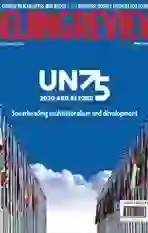Fighting Three Viruses
2020-10-22ByDingZhitao
By Ding Zhitao
In 1945, after two world wars, most countries were in ruins and the survivors craved an end to the dark days of pain, hunger and humiliation.
The UN was founded to address these challenges and for three quarters of a century, the world in general has been free from the scourge of war. More countries have gained national independence and economic prosperity, and more than 1 billion people have emerged from poverty. The vision of the founders of the UN has become a reality.
However, on September 21, when the 193-member world body commemorated its 75th anniversary, the celebrations were muted. Nobody felt cheerful and no place was safe for gathering together or shaking hands. Three kinds of rampant viruses stood in the way.
First, the novel coronavirus.
The severe acute respiratory syndrome coronavirus 2, the virus causing the novel coronavirus disease(COVID-19), had infected more than 36 million and killed more than 1 million people all over the world as of October 9, according to the Johns Hopkins University COVID-19 dashboard.
The numbers continue to rise at a rate of more than 200,000 infections and thousands of deaths daily. These are no mere numbers to add or curves to fl atten. Behind every victim, there are families suffering pain and sorrow.
Besides the health and humanitarian crisis, what is happening is also a social and economic crisis. Prolonged lockdowns have set people and nations apart. Society has yet to resume normal functioning.
For the less advantaged groups, such as women, children and those living in underdeveloped areas, the blow is harsher. Many of them are woefully underprepared for the virus and risk sliding into deeper poverty and violence. The pandemic has aggravated all the challenges the UN faces in achieving the Sustainable Development Goals by 2030 to address worldwide social, economic and environmental challenges.
Second, the political virus.
The fi nger-pointing, blame game and cover-ups are equally deadly. Some politicians in the U.S. keep calling the virus the “Wuhan virus” or “China virus,” trying to shift the responsibility for failing to respond to the pandemic effectively.
This political virus kills too. The time, energy and resources invested in the shame-and-blame approach could have been put to better use—in saving lives. Reports released by the U.S. House Select Subcommittee on the Coronavirus Crisis indicate that some politicians deliberately covered up the truth of the pandemic.
Third, the virus of unilateralism, bullying, racism, populism, nationalism and more.
Populism and nationalism have failed to address COVID-19. Those approaches to contain the coronavirus have provenly made things manifestly worse. Breaking commitment and stepping back from international organizations do not help either. These attempted remedies are actually another form of virus. This form of virus turns people against people, nation against nation, and reintroduces the law of the jungle in the world.
Bullying others and always putting oneself ahead will not make any nation great, nor help to survive this existential COVID-19 crisis of the humankind. Like the proverb said, if you want to walk fast, walk alone; if you want to walk longer, walk together.
A long walk requires an all-society, all-government and all-world approach driven by compassion and solidarity. To confront the virus in all forms, people around the globe are looking up to the UN to take a leading role and collective action to address the pandemic, besides the other common challenges of climate change, regional confl icts and unbalanced development.
The World Health Organization is working closely with governments and its partners to protect public health and prevent the spread of the pandemic. In addition, UNICEF, the UN World Food Program and other UN bodies have adjusted their operations based on the development of the pandemic and are playing their respective roles in humanitarian support.
China has been a staunch supporter of the UN, taking pride in its role as a builder of world peace, contributor to global development and keeper of international order. To support the UN role in leading the global effort to contain COVID-19, China made a new pledge on September 23 to provide funds and support in other forms to fi ght the common enemy.
The coronavirus, as well as the other forms of virus, have driven home the value of multilateralism to address our collective challenges. United, not divided; cooperative, not confronting; and all-win, not zero-sum game represent the trend of the time. It is the UN and it is multilateralism that we count on to lead humanity on the right path and chart a way out of our own “1945 moment” together.
